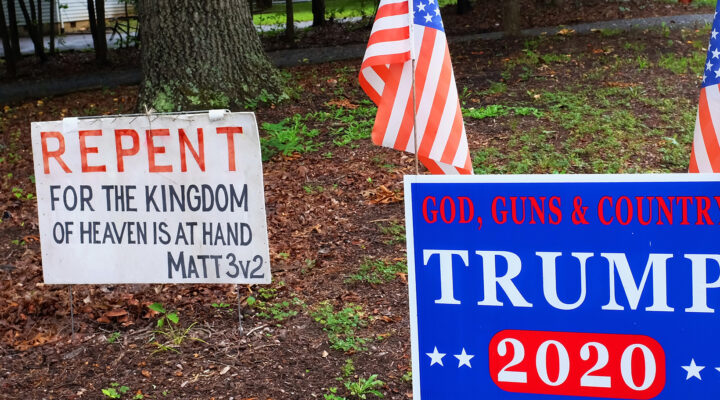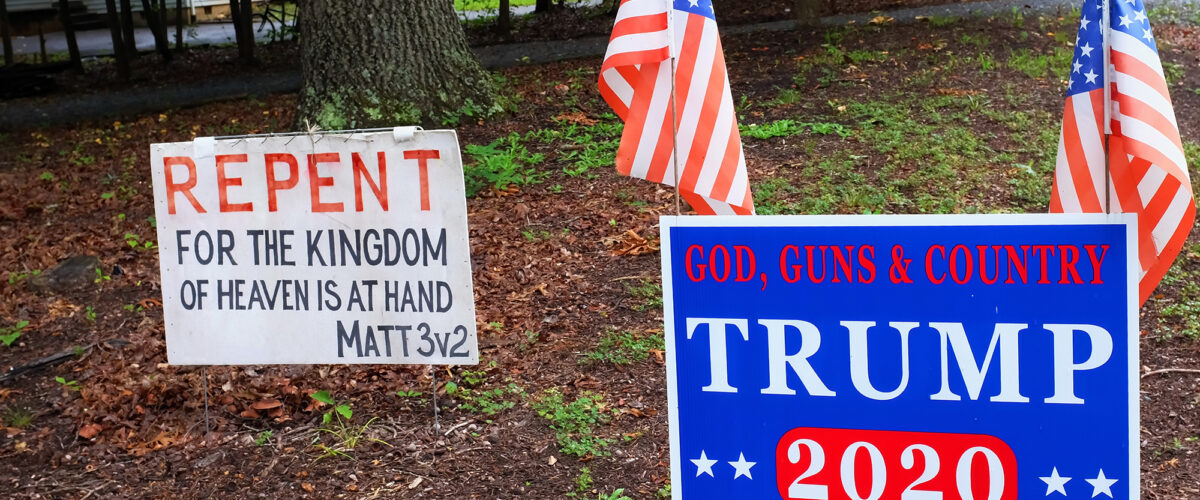Donald Trump failed to “totally destroy” the Johnson Amendment as he promised evangelical Christian supporters, but a current case may demonstrate whether the no-politicking policy for tax-exempt organizations has any teeth left.
The Johnson Amendment is a 1954 law that says 501(c)(3) organizations — which includes churches and many other nonprofits — may not endorse political candidates or participate in partisan political campaigns, under threat of losing their nonprofit status. The law has been seen as a deterrent — or handicap, depending on perspective — for pastors endorsing political candidates from the pulpit.
Thus, one of Ronald Reagan’s most famous lines while running to become president in 1980. Speaking to a large group of evangelical pastors in Dallas, Reagan quipped: “I know you can’t endorse me, but I endorse you.”
Oversight of this law falls to the Internal Revenue Service, which has been reluctant to go after churches even when they clearly violate the statute. Only a handful of cases have been pursued in the past seven decades, and only one church has lost its tax-exempt status.

Greg Locke preaching May 15
There’s a new test case on the horizon, though, involving one of the most flamboyant and attention-seeking pastors of the Trump era: Greg Locke of Nashville. Locke is a COVID-denying, male-domination supporting, gun-toting, gay-hating, conspiracy theory promoting pastor who not long ago held an old-fashioned book burning with his congregation — which is a tax-exempt organization.
Locke’s blatant support for Trump and vitriol for Trump’s opponents is well-documented, but he recently crossed a new line that is as blatantly partisan as possible — and he’s not alone. Locke said out loud the new mantra of some of the most far-right religious conservatives nationwide: If you vote for a Democrat, you can’t be part of the church.
On Sunday, May 15, Locke told his Global Vision Bible Church: “You cannot be a Christian and vote Democrat in this nation” and “If you vote Democrat, I don’t even want you around this church. You can get out.”
A conservative Southern Baptist pastor from Texas had tweeted a similar idea a few days earlier. Tom Buck of Lindale, Texas — a frequent critic of leadership in the Southern Baptist Convention and a prolific tweeter — on May 11 said: “In light of today’s vote by Democrats to legalize abortion until moment of birth, we are rapidly reaching the point that voting for a Democrat should be a matter of church discipline.”
“Church discipline” means removing someone from church membership unless they repent of a grievous sin. While seldom practiced in Christian churches in the last 100 years, the concept of church discipline is favored by many more legalistic pastors in the Reformed tradition, even among Baptists.
Especially since the rise of Trump, as the Republican Party has become more beholden to the agenda of the Religious Right, the most conservative evangelicals have equated voting for any Democratic candidate as sinful. But saying so from the pulpit is another thing.

Rachel Laser
The day after Locke’s fiery tent-revival sermon, Americans United for Separation of Church and State called on the IRS to investigate Global Vision Church, saying Locke had clearly violated the Johnson Amendment.
“Now, when our democracy is threatened by white Christian nationalism like never before, the IRS must investigate blatant Johnson Amendment violations like Locke’s remarks and enforce the federal law that protects the integrity of both our elections and our houses of worship by ensuring nonprofits don’t engage in partisan politics,” said Rachel Laser, president of Americans United. “Tax exemption is a privilege, not a constitutional right. The government has attached sensible strings to that privilege. This rule, which is broadly popular among religious and nonreligious Americans alike, ensures charitable donations meant for the common good are not spent on corrosive partisan politics.”
Across the years, various church-state watchdog groups have called for investigations of pastors and congregations — on the left and right — that have openly endorsed candidates. After becoming president, Trump attempted to use an executive order to nullify the Johnson Amendment, but no president has the authority to un-pass a federal law.
Although separation of church and state is a hallmark of U.S. governance enshrined in the Bill of Rights, the connection to tax-exempt status only dates back to 1954 and was prompted by a personal concern of then-U.S. Sen. Lyndon Baines Johnson of Texas. Johnson pushed the bill amending the U.S. Tax Code through Congress, hoping to silence two nonprofit groups campaigning against him in McCarthy-like fashion as “a closet Communist.”
Johnson’s plan worked, and the bill was signed by then-President Dwight D. Eisenhower.
Although separation of church and state is a hallmark of U.S. governance enshrined in the Bill of Rights, the connection to tax-exempt status only dates back to 1954.
Particularly since the rise of the Religious Right in the 1970s, some of the most conservative of evangelical pastors have chafed under the threat of losing tax exemption for their congregations. But others — especially centrist and progressive pastors and nonprofit leaders — have worked diligently to stave off a true repeal of the Johnson Amendment, which has been attempted several times in Congress.
One of the current arguments in favor of retaining the Johnson Amendment is that it keeps so-called “dark money” from passing through churches and other charities to aid political campaigns.
In 2017 when Republicans sought to repeal the amendment, Amanda Tyler, executive director of Baptist Joint Committee for Religious Liberty, warned that repeal of the Johnson Amendment could turn houses of worship and other nonprofits into Political Action Committees.
Also in 2017, David Heinen, vice president for public policy and advocacy with the North Carolina Center for Nonprofits, made a case for not changing the law. “It might seem like semantics and/or legalese, but engaging in partisan politics is very different from speaking out on policy issues,” he wrote. “The Johnson Amendment prohibits 501(c)(3) organizations from engaging in the partisan political process, but it doesn’t limit issue advocacy by nonprofits.”
Heinen’s group joined BJC and about 4,500 other nonprofits in urging Congress not to repeal the Johnson Amendment in 2017. Ultimately, the effort was derailed by the Senate parliamentarian, who ruled the effort procedurally improper.
Related articles:
Baptist Joint Committee exec says saving Johnson Amendment a win for religious liberty
Language weakening Johnson Amendment survives House of Representatives vote
Baptists join other religious leaders in opposing Johnson Amendment repeal
Baptist groups among faith organizations opposing Johnson Amendment repeal


